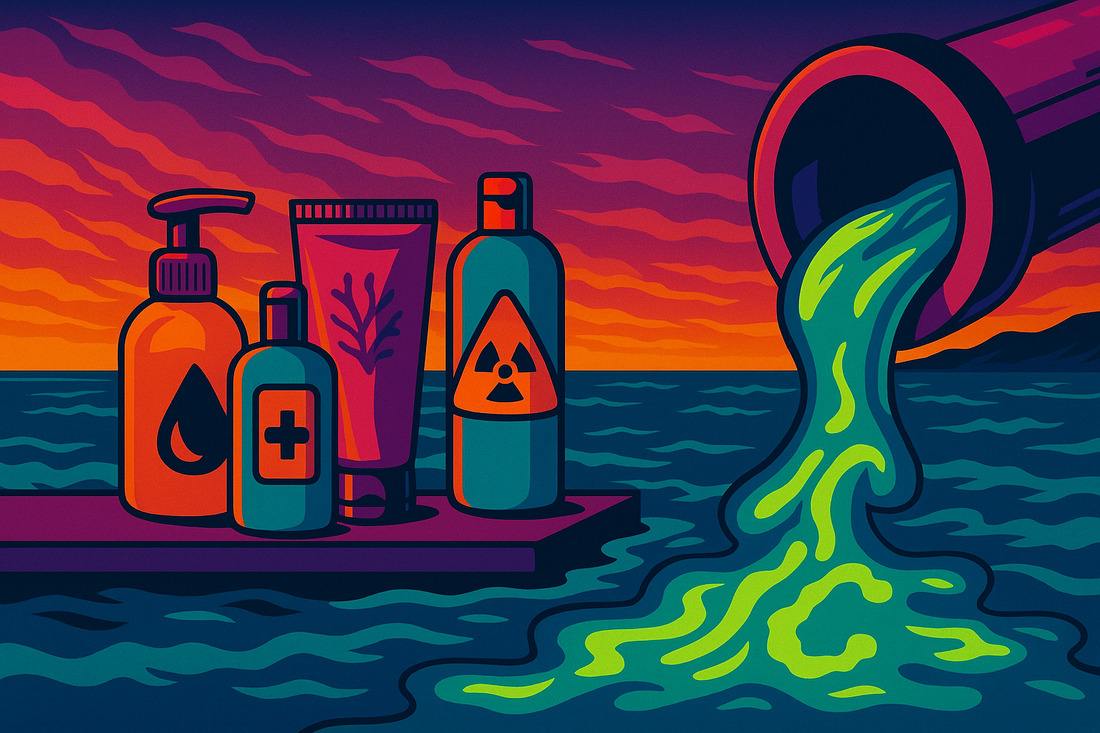
Coral Can Smell You Coming: How Your Morning Routine Poisons the Reef
“The ocean doesn’t need another apology. It needs you to stop leaking sunscreen into its lungs.”
— Immoral Coral
It Starts Before You Even Hit the Beach
You wake up, brush your teeth, wash your face, throw on some SPF, maybe add a squirt of hair product. Feels clean. Feels fresh. Feels good.
Until it washes off your skin, down the drain or into the surf, and hits the reef like a chemical flare.
Corals don’t scream. They don’t run. But they do react. And research shows they can literally detect the chemical signals humans leave behind—sunscreen, detergent, fragrances, even the faint residue of deodorant. To coral, you don’t just smell like trouble. You are.
Our presence in the water, even unintentional, leaves behind a signature trail of stress. And coral reefs, already weakened by heat, acidification, and pollution, are being forced to process it all.
The Reef Isn’t Just Dying — It’s Defending Itself
Let’s get one thing straight: coral isn’t fragile. It’s sensitive. There’s a difference.
Corals are living animals, and they interact with their environment constantly. When exposed to certain chemical compounds like oxybenzone (found in most sunscreens) or triclosan (common in antibacterial soap), they trigger defensive responses. These include:
-
Expelling their symbiotic algae (which causes bleaching)
-
Producing mucus layers to protect themselves
-
Slowing or stopping reproduction entirely
It’s like if every time you walked into a room, your skin started peeling and your lungs shut down.
And yet we keep lathering up like it’s no big deal.
Your Bathroom Shelf vs. the Reef
This isn’t just about sunscreen. The stuff we wash down our sinks and tubs ends up in rivers, then estuaries, then the sea. Even if you never set foot in the ocean, coral still feels you.
Common reef-toxic chemicals include:
-
Oxybenzone and octinoxate (sunscreens)
-
Phthalates and synthetic musks (fragrances)
-
Sodium laureth sulfate (in shampoos and body wash)
-
Triclosan (antibacterial soaps)
-
Nonylphenols (in laundry detergents)
And no, “reef-safe” isn’t always safe. The term isn’t regulated. Plenty of brands slap it on packaging without testing toxicity on coral or marine life.
So, What Can You Do?
Start small. Start smart. Reef protection begins in your shower, not just on the shoreline.
Try this:
-
Switch to mineral-based sunscreens with non-nano zinc oxide
-
Look for fragrance-free or naturally scented products
-
Use eco-certified detergents and biodegradable cleaners
-
Support brands that don’t greenwash
-
Pressure your favorite companies to reformulate
The ocean doesn’t need perfection. It needs less poison.
Wearing Your Impact
At Immoral Coral, we believe reef defense goes beyond just beach cleanups and big gestures. It’s in the things you choose to touch your body, your clothes, and your water. Every shirt we make is designed to be worn with purpose—not just to avoid harm, but to flip the script entirely.
We’re not here to guilt you for your skincare routine. We’re here to help you make it mean something.
So next time you reach for that neon-pink body wash or spray-on cologne, ask yourself:
Would I pour this straight onto coral?
Because, in a way, you already are.
